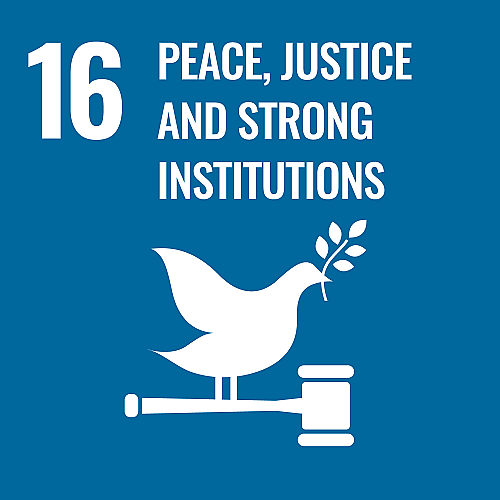Sustainability
MUBAS for Sustainable Development
Explore this section
SDG 16: Peace, Justice and Strong Institutions


Peace, Justice, and Strong Institutions, aims to promote peaceful and inclusive societies, provide access to justice for all, and build accountable, transparent, and effective institutions at all levels. It focuses on reducing violence, fighting corruption, ensuring the rule of law, and protecting fundamental freedoms.
Indicators
16.2.1 Elected representation on governing body.
The University Council is the highest governing body of our institution. The University’s Act on Part 3, subsection (9) outlines the composition of the Council which is made up of faculty members, staff and students.
University Governing Body
16.2.2 Existence of independent student union.
The Students Representative Council (SRC) operates independently, representing student interests in university governance and welfare decisions.
Students' Union
16.2.3 Identify and engage with local stakeholders.
The university has in place written procedures that guide its engagement with external stakeholders; individuals and organisations beyond the institution itself. According to the document , MUBAS sets out clear processes to identify local stakeholders (such as community groups, industry partners, government agencies, NGOs) and engage with them in a structured and transparent manner. This includes steps for stakeholder mapping, consultation, feedback mechanisms, and periodic review of engagement outcomes.
Community Engagement Guidelines
16.2.4 Participatory bodies for stakeholders’ engagement.
The Community Engagement page outlines collaborative mechanisms that allow local authorities and civil society to contribute to university planning and outreach programmes.
Mechanisms of Engagement
16.2.5 University principles on corruption & bribery.
The Integrity and Anti-Corruption at MUBAS’ details policies on ethical conduct, transparency, and prevention of bribery and organized crime. At MUBAS, integrity is at the core of our values. The university upholds the highest ethical standards in all its operations, fostering a culture of honesty, accountability, and transparency among staff, students, and stakeholders. Integrity is not an obligation—it is a personal choice that defines who we are and how we serve.
Integrity and Anti-Corruption
16.2.6 Academic freedom policy.
The Academic Freedom statement affirms MUBAS’ commitment to protecting the rights of faculty and students to pursue and communicate knowledge without interference. At MUBAS, we uphold academic freedom as a cornerstone of higher education. The university protects the right of scholars, researchers, and students to explore ideas, challenge assumptions, and share knowledge freely, within the bounds of professional ethics and respect for others.
Academic Freedom
16.2.7 Publish financial data.
The Reports page provides access to financial and performance reports, reflecting institutional transparency and accountability. The university publishes its financial data on its website; currently, only the signed financial statements for 2022 are publicly available. Other years’ financial data appear to be treated as private (not formally signed or publicly posted) and therefore are not accessible via the public domain.
Financial Statement
16.3.1 Provide an expert to government.
MUBAS provides research-based policy advice to various government departments to imp
rove governance systems. The University has engaged actively with public-sector governance through offering expert advice and capacity-building support to governmental bodies. The university provides policy guidance and participates in leadership and governance programmes that enhance the effectiveness of public institutions, thereby contributing to national and regional governance reforms.
Public Sector Governance
16.3.2 Policy and lawmakers outreach and education.
The Malawi University of Business and Applied Sciences (MUBAS) hosted a public lecture on land reforms and governance, convening policymakers, law-makers, academics and practitioners to engage with critical issues surrounding land rights, regulatory frameworks and institutional governance in Malawi. This outreach event exemplifies the university’s commitment to offering up-skilling and capacity-building opportunities for stakeholders in policy and legislative arenas, thereby supporting evidence-based decision-making and advancing governance reforms.
Public Lecture
16.3.3 Participation in government research.
The Malawi University of Business and Applied Sciences (MUBAS), in collaboration with government stakeholders, hosted a public lecture focused on land reforms and governance in Malawi. While the event primarily involved education and outreach, this collaboration signals the university’s ongoing alignment with public-sector policy research, particularly in the area of land governance, which is of national importance.
Public Lecture
16.3.4 Neutral to discuss issues.
The Malawi University of Business and Applied Sciences (MUBAS) hosted a public lecture on land reforms and governance, providing a neutral platform where diverse political stakeholders government officials, academics, practitioners, and community representatives could openly discuss key national challenges around land management and governance. The event facilitated frank dialogue across different interests and contributed to creating a “safe space” for deliberation of policy issues.
Public Lecture
16.4.1 Number of graduates.
Malawi University of Business and Applied Sciences (MUBAS) successfully graduated a total of 1,707 students during the reporting period. This milestone reflects the university’s continued commitment to producing skilled, competent, and industry-ready graduates across various disciplines. The diverse academic programs at MUBAS equip learners with practical and entrepreneurial skills aligned with Malawi’s development agenda and global workforce demands.
Number of Graduates
